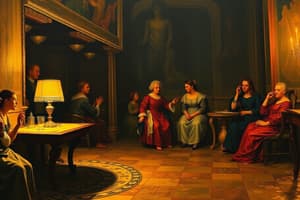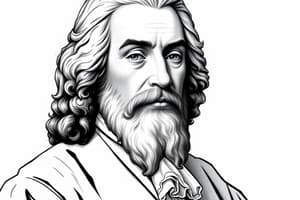Podcast
Questions and Answers
What is the primary goal of a political association according to the Declaration of the Rights of Man and Citizen?
What is the primary goal of a political association according to the Declaration of the Rights of Man and Citizen?
- To establish a sovereign state
- To restrict individual liberties
- To protect the natural and inalienable rights of man (correct)
- To promote colonialism and imperialism
What is the source of all sovereignty according to the Declaration of the Rights of Man and Citizen?
What is the source of all sovereignty according to the Declaration of the Rights of Man and Citizen?
- The aristocracy and nobility
- The church and religious institutions
- The monarch or ruler
- The nation as a whole (correct)
What is the definition of liberty according to the Declaration of the Rights of Man and Citizen?
What is the definition of liberty according to the Declaration of the Rights of Man and Citizen?
- The power to do whatever one desires
- The power to do whatever is not injurious to others (correct)
- The freedom to participate in the slave trade
- The right to rebel against the government
What is the primary purpose of law according to the Declaration of the Rights of Man and Citizen?
What is the primary purpose of law according to the Declaration of the Rights of Man and Citizen?
According to the Declaration of the Rights of Man and Citizen, who has the right to participate in the formation of law?
According to the Declaration of the Rights of Man and Citizen, who has the right to participate in the formation of law?
What is the relationship between citizens and the law according to the Declaration of the Rights of Man and Citizen?
What is the relationship between citizens and the law according to the Declaration of the Rights of Man and Citizen?
What is the fundamental principle of the Declaration of the Rights of Man and Citizen regarding individual rights?
What is the fundamental principle of the Declaration of the Rights of Man and Citizen regarding individual rights?
What is the primary responsibility of the state according to the Declaration of the Rights of Man and Citizen?
What is the primary responsibility of the state according to the Declaration of the Rights of Man and Citizen?
What is the underlying philosophy of the Declaration of the Rights of Man and Citizen?
What is the underlying philosophy of the Declaration of the Rights of Man and Citizen?
Which of the following is NOT a fundamental principle of the Declaration of the Rights of Man and Citizen?
Which of the following is NOT a fundamental principle of the Declaration of the Rights of Man and Citizen?
Flashcards are hidden until you start studying
Study Notes
The Emergence of Enlightenment Ideas
- Philosophers like John Locke and Jean Jacques Rousseau proposed a society based on freedom, equal laws, and opportunities for all.
- Locke's Two Treatises of Government refuted the doctrine of the divine and absolute right of the monarch.
- Rousseau advanced the idea of a social contract between people and their representatives.
The Concept of Separation of Power
- Montesquieu's The Spirit of the Laws proposed a division of power within the government between the legislative, executive, and judiciary.
- This model was adopted in the USA after the American Revolution.
The Impact of Enlightenment Ideas
- The American Constitution and its guarantee of individual rights influenced political thinkers in France.
- The ideas of philosophers were discussed in salons and coffee-houses and spread through books and newspapers.
The French Social Context
- The middle class, comprising merchants, manufacturers, and professionals, emerged in the 18th century and sought to end privileges.
- They believed that no group in society should be privileged by birth.
- The growing middle class was educated and had access to new ideas.
The Declaration of the Rights of Man and Citizen
- The Constitution began with a Declaration of the Rights of Man and Citizen, establishing 'natural and inalienable' rights.
- These rights included the right to life, freedom of speech, freedom of opinion, equality before law, and security.
- The state was responsible for protecting each citizen's natural rights.
The Principles of the French Revolution
- The aim of every political association is to preserve the natural and inalienable rights of man.
- Sovereignty resides in the nation, and no group or individual may exercise authority that does not come from the people.
- Liberty consists of the power to do whatever is not injurious to others.
- The law has the right to forbid only actions that are injurious to society.
Studying That Suits You
Use AI to generate personalized quizzes and flashcards to suit your learning preferences.




